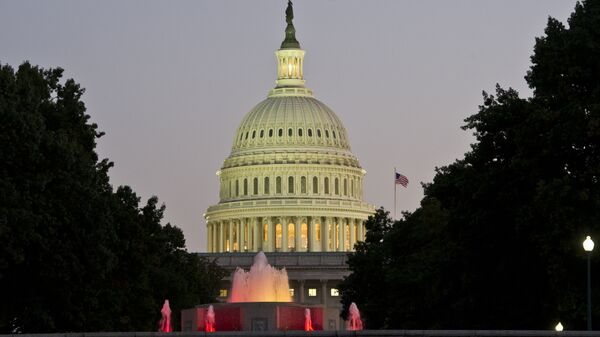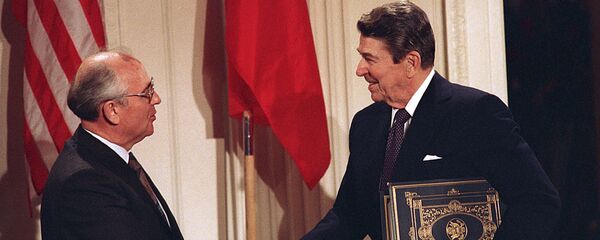US President Donald Trump has ordered Secretary of State Mike Pompeo to draft new sanctions against Russian officials who Washington believes are violating the 1987 Intermediate Nuclear Forces treaty (INF).
It’ s Congress’ Fault
The memorandum signed by Trump references an annual defense policy bill that lawmakers passed last year. It makes it mandatory for the president to prepare a list of sanctions against senior Russian officials allegedly responsible for breaching the 1987 accord.
Donald Trump is thus seen as distancing himself from this move, putting the blame on Congress.
The bill accuses Russia of deploying a ground-based cruise missile in violation of the 1987 pact that bans testing and fielding missiles with ranges of 500-5,500 kilometers (310-3,417 miles), known as the INF Treaty.
Russia denies violating the treaty and says that the missile in question has a gliding warhead and, therefore, is not categorized as a land-based cruise missile because it has a different speed and flight trajectory.
As for the US missile defense interceptors in Europe, they can be used to launch Tomahawk cruise missiles, which Russia sees as a serious violation of the INF treaty.
Meanwhile, the US Congress has authorized the release of $58 million for “countermeasures to violations of the INF accord,” including the development of a new land-based US medium-range ballistic missile.
The State Department, together with the Treasury and Commerce Departments, will now have to draw up a list of purported “violators” and decide how to “punish” them.
What Washington Wants
Washington no longer needs the INF accord but would like to see Russia unravel it instead, Dmitry Ofitserov-Belsky, a Moscow-based foreign affairs expert, said.
“The US wants to pull out of the agreement now that it has seriously amended its nuclear program to allow a wider use of nuclear weapons. Therefore, the Americans see it as imperative to withdraw from the INF accord while blaming it on Russia,” Ofitserov-Belsky added.
Road to Nowhere
Alexei Arbatov, director of the Russian Academy of Sciences’ Center for Global Security, believes that using sanctions in a situation of mutual claims is the most counterproductive way to go and will only exacerbate existing tensions.
“The Americans believe that new sanctions will force Russia to say it’s sorry. Conversely, it will make Russia toughen its position because Moscow will not agree to a compromise under the pressure of sanctions,” Arbatov added.
He also believes that Russia would only benefit from scrapping the INF accord because the geostrategic situation has changed since Mikhail Gorbachev and Ronald |Reagan signed it more than 30 years ago. Indeed, the intermediate-range missiles the Americans were deploying in Germany, Britain, Italy and some other countries can now be stationed in Poland, Romania and the Baltic countries, which are closer to Russia’s borders. In this sense, the situation has become more dangerous for Russia than it was in 1987.
READ MORE: Russian Embassy in US Debunks Accusations of Alleged INF Treaty Violation
“New weapons, such as long-range UAVs and variable-range cruise missiles have come along, so some of the provisions of the INF accord need to be changed. Still, Russia cannot afford withdrawing from it because, with the existing relations with NATO, the US and other countries, this would seriously undermine its security,” Alexei Arbatov concluded.





